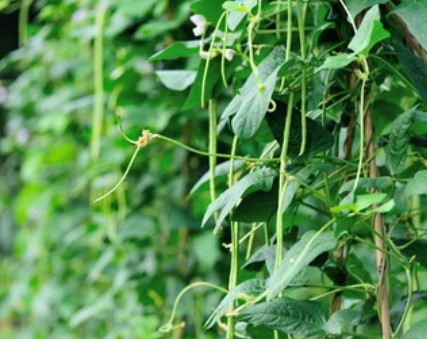Vigna unguiculata, also known as cowpea, is an everyday vegetable fed on tender pods or seeds, which are rich in high-quality protein, vitamins, and folic acid. Pests and fungal diseases are important factors that cause severe yield decline and limit the scale of cowpea production. Conventional breeding to select highly resistant and high-quality cowpea varieties is difficult and time-consuming and results in a decline in crop genetic diversity and loss of beneficial genes. The development of transgenic technology has opened new avenues for improving cowpea varieties, which can significantly shorten the breeding cycle and enable targeted improvement of specific traits. Transgenic technology is an expedient method for biologically directed improvement and molecular breeding. With the development and application of GM technology in modern agriculture, transgenic cowpea products aimed at improving cowpea yield, herbicide resistance, insect resistance, and drought tolerance have been produced.

Lifeasible has established a proven platform for Agrobacterium-mediated cowpea transformation to provide our customers with large-scale, efficient, and standardized cowpea genetic transformation services. In short, the entire process is carried out by experts through the induction of embryonic guardian tissue and co-culture with Agrobacterium, followed by regeneration of stems and roots, resulting in a complete cowpea transgenic plant. Our team of experts has been involved in plant genetic transformation experiments for many years. It is able to customize one-on-one solutions to meet the needs of our clients and enhance the efficiency of the entire transformation process with their proficiency. To meet your needs, we have a range of different types of Agrobacterium strains (LBA4404, GV3101, EHA105, AGL1, C58, GV2260) and custom-labeled vectors (kanamycin, thioamycin, glufosinate, G418) for you to choose from. Our various gene modification services are shown in the following.

Customers can provide constructed cowpea transformation vectors directly, and Lifeasible also offers vector construction services.
| Concentration | Volume | Other requirements |
| 80-100 ng/μL | ≥10 μL | no degradation & no contamination |
| Bacterial broth | Bacterial plate |
| Bacterial broth up to 1-year-old, preserved in glycerol | Bacterial plate activated within one week |
*For special varieties and customized services, the experiment time and the number of seeds needed may be increased. For this, please contact our staff for more information.
*Plasmids, E. coli, and Agrobacterium require cryopreservation and mailing under dry ice to avoid degradation, inactivation, and impact on experimental results.
*The strains, vectors, and receptor materials used in the experiment can be saved for free for half a year for customers, and you can pick them up at any time if you need them.
All of our standardized genetic modification services for cowpea are equipped with a team of experts who have been engaged in plant genetics research for many years, ensuring stability, reliability, and efficiency. In the pre-experimental stage, experts mainly provide professional technical advice and guidance and assist clients in project optimization. In the middle of the experiment, we make sure to communicate with you regularly so that the project's progress is under your control. After the project is completed, we will provide you with the agreed results and take care of guiding the transplanting of positive seedlings to ensure their survival. All you need to do is to confirm the final experimental protocol in an in-depth discussion with our experts and submit samples as required.
Lifeasible's experts have comprehensive knowledge and years of experience solving technical challenges in vigna unguiculata transformation. We can provide customized solutions to help you study a wide range of cowpea varieties. Our services guarantee the success of your project. For more information or any inquiry needs, please feel free to contact us.
Lifeasible has established a one-stop service platform for plants. In addition to obtaining customized solutions for plant genetic engineering, customers can also conduct follow-up analysis and research on plants through our analysis platform. The analytical services we provide include but are not limited to the following:
July 13, 2024